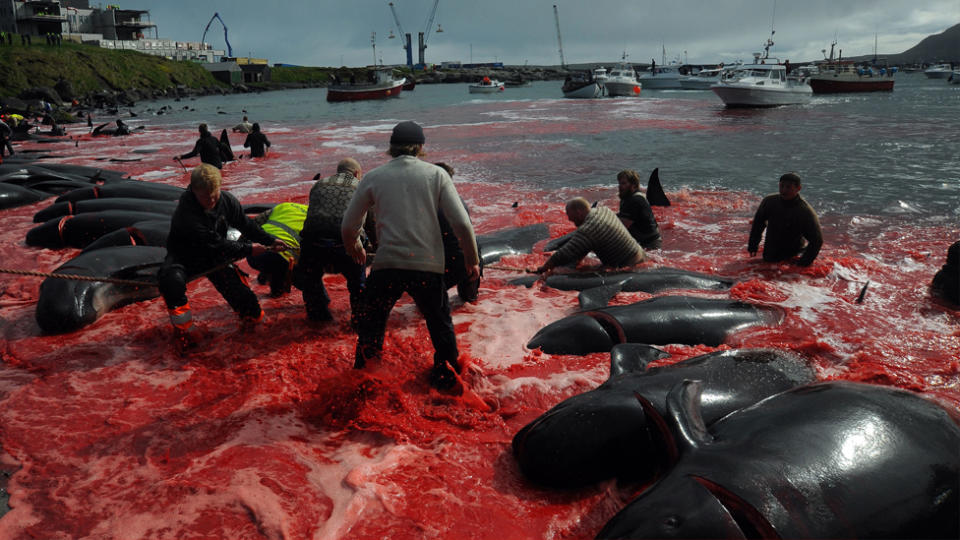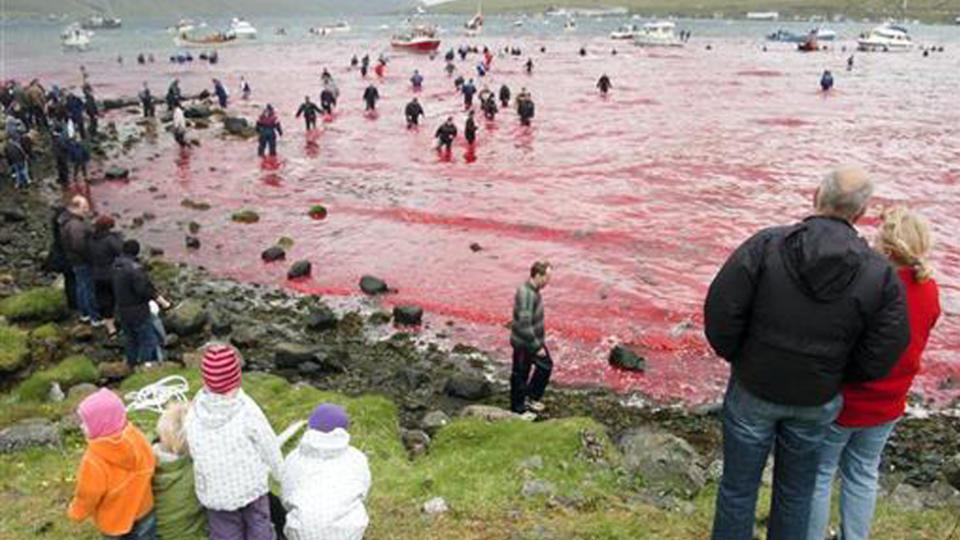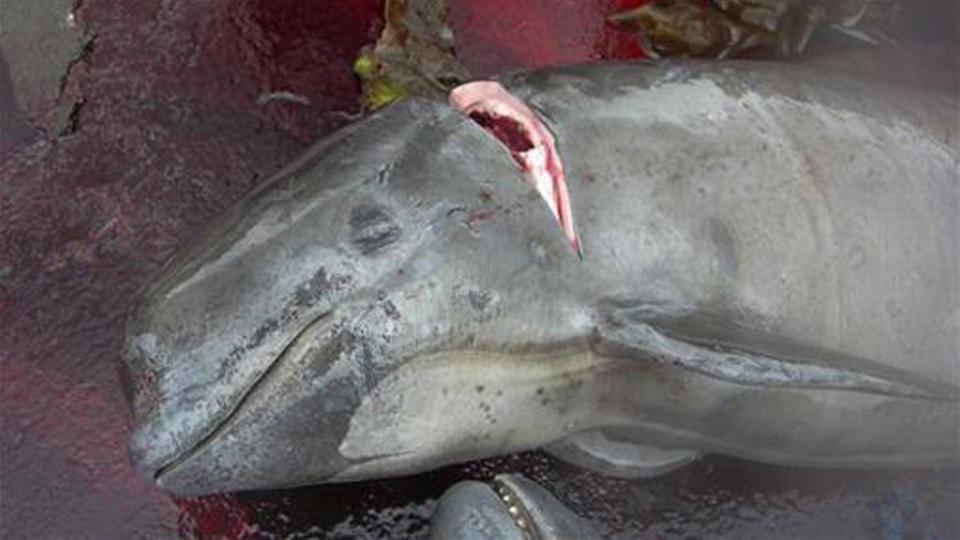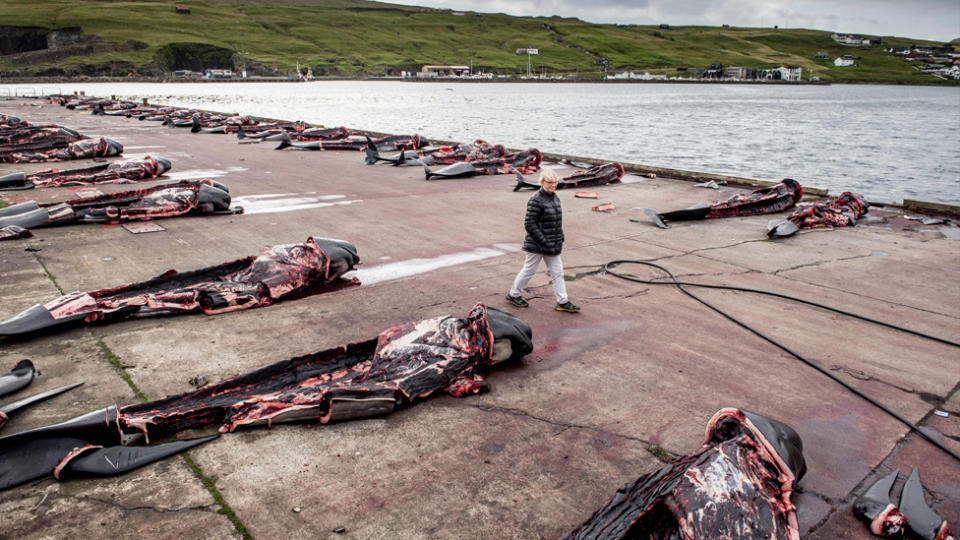'Barbaric': Shocking image shows sea turning red as over 250 whales killed
WARNING - DISTRESSING IMAGES: Each year the water around the Faroe Islands, Denmark turns blood red as the annual slaughter of pilot whales takes place.
The NGO Sea Shepherd said 252 whales and 35 white-sided dolphins were killed last Wednesday near the village of Hvalba.
“On average, 1500 dolphins are massacred every year in the Faroe Islands, which invoke an ancestral tradition to justify this barbaric practice,” Sea Shepherd France wrote on Facebook.

When the conditions are right, a call is put out to the town and a crowd of locals take to the ocean in small boats, where they herd the mammals into shallow water and the blood bath begins.
“When the Grindadràp (translated as "the murder of whales") occurs, entire pods of family units are driven onto the beaches and viciously and mercilessly slaughtered with spears, clubs and knives,” Sea Shepherd founder Paul Watson wrote on Facebook.
'Heartbreaking' video shows calf isolated as hunters move in to slaughter whales
'Up to their waists in blood': New drone video exposes Japanese dolphin slayers
Innocent-looking photo of men swimming with dolphin hides cruel act
“Each and every individual is murdered, males, females, mothers and calves.”
The Faroese aren't involved in commercial whaling, they don't sell the meat, instead it is divided among the local community and they are free to sell their share.

Whales sliced up in shallow water
The tradition, also known as a ‘grind’ can be traced back for over 1000 years and is the longest continuously practised whaling tradition in the world.
A grind must take place in one of the 23 approved beaches. Currents must be calm and there must be enough participants to crew the boats used to draw the whales to shore.
In some years, such as 2018, conditions were not ideal and no whales were taken.

Once the whales are in shallow water, locals rush in and use knives and hooks to slice the whale's neck and break the spinal cord.
A traditional calculation is used to divide the meat in the community, villagers are responsible for butchering their own meat.
Usually long-finned pilot whales are targeted, although bottlenose dolphins and other dolphin species often end up in the haul.

The Faroe government have an approved list of species approved for the annual hunt and none of the species listed are considered endangered.
The Risso's dolphins are sometimes caught even though they aren't on the Faroe government's approved list of species for hunting.
The International Union for Conservation of Nature lists long-finned pilot whales as "data deficient," meaning there isn't enough scientific evidence to judge the status of the North Atlantic population.
While other cultures started whaling long before the Faroese, most have since stopped or changed their technique.

Protests against the whale hunt
The Sea Shepherd has been working to stop the practice since the 1980s but the Faroese stand strong behind their tradition.
"It [is] important for us to protect our ways," Bjarki Dalsgarŏ, a local who participates in the grinds told National Geographic.
Russell Fielding, a geographer from the University of the South in Sewanee, Tennessee who has studied the Faroe Island grinds since 2005 said the protests provide a sense of community for the locals who band together to protect their traditions.
"They do feel a real cultural attachment to [the grinds]," Mr Fielding told National geographic in 2014.

In a statement on last week’s killings, Sea Shepherd told The Independent it was the only organisation which had ever opposed the hunts on site.
The group said it sent a mission in 2014 to disrupt one of the hunts, which led to the passing of a local law to prohibit Sea Shepherd ships from being in the area.
National Geographic reports at the time 14 volunteers were arrested with six of the protestors found guilty of interfering with the grind.
Do you have a story tip? Email: newsroomau@yahoonews.com.
You can also follow us on Facebook, Instagram and Twitter and download the Yahoo News app from the App Store or Google Play.



